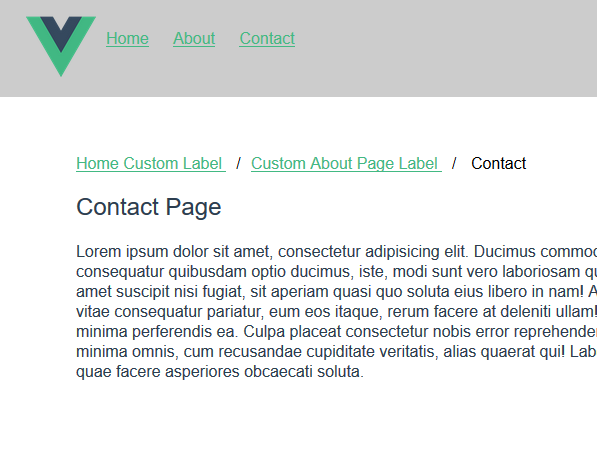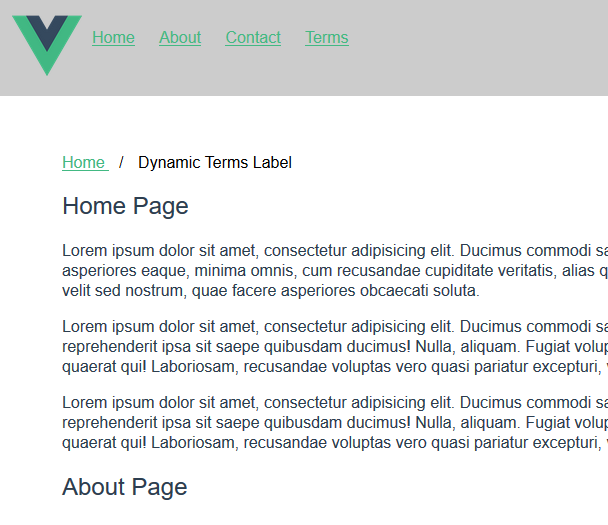@letsnova/vue-2-crumbs
v0.5.6
Published
Breadcrumbs plugin for Vue.js 2 framework that allows to select parent route in route meta object with no need of sub-routing
Downloads
5
Maintainers
Readme
vue-2-crumbs
Breadcrumbs plugin for Vue.js 2 framework allows to select parent route in route meta object with no need of sub-routing.
Features:
- Setting parent route without need to actually nest it in children array
- Customized template are allowed using scoped slots
- Sub-routing as default behavior
- Define breadcrumb info in page component
- Shorthand labeling (
breadcrumb: 'Page Label') - Define parent's params, query, hash
- Dynamic breadcrumbs (with some caveats).
Installation
$ npm install vue-2-crumbs --saveimport Vue from 'vue'
import Vue2Crumbs from 'vue-2-crumbs'
Vue.use(Vue2Crumbs)After that <app-breadcrumbs></app-breadcrumbs> component would be at your disposal.
Usage
Use the breadcrumb property in route's meta to provide route label or/and parent route name as in example below:
Simple Example
new VueRouter({
routes: [
{
path: '/',
name: 'home', // Be sure to set 'name' property for the route you want to be "parent" route
component: Home,
meta: {
breadcrumb: 'Home Custom Label' // This is a shorthand for case you want to set just breadcrumb label
}
},
{
path: '/about',
name: 'about',
component: About,
meta: {
breadcrumb: {
label: 'Custom About page Label',
parent: 'home' // Here you should use exact string as for name property in "parent" route
}
}
},
{
path: '/contact',
name: 'contact', // name property would also used as default route label for breadcrumbs
component: Contact,
meta: {
breadcrumb: {
parent: 'about'
}
}
}
]
})Result:

Custom template
(new in v0.5.1)
By default component's template is ul > li > router-link. But starts with v0.5.1 you can provide custom template using scoped slots and container prop at app-breadcrumbs component.
You will have label string to object and utils object at your disposal. utils is helper object, that serves you to contain all information you may want to use in custom template. Aware that utils can be undefined, so you need to check it before use it in template.
To define utils object just add it to breadcrumb object in router definition or directly in component.
For targeting current page in breadcrumb chain, use named slot - current. Parents breadcrumb chunks is default slot.
Note: Obviously, you should define router-link at some point, in your custom template for make breadcrumbs work.
Example:
<app-breadcrumbs container="nav">
<h6 slot-scope="{to, label, utils}">
<router-link
:to="to"
class="your-custom-class"
exact
:itemprop="utils && utils.itemprop"
>{{label}}</router-link>
<i class="fas fa-angle-right"></i>
</h6>
<span
slot="current"
slot-scope="{label}"
class="custom-current-class"
>{{label}}</span>
</app-breadcrumbs>Sub-routing
Plugin also supports default behavior for nested routes:
new VueRouter({
routes: [
{
path: '/',
name: 'home',
component: Page,
children: [
{
path: '/about',
component: About,
meta: {
breadcrumb: {
label: 'Custom About page Label'
}
},
children: [
{
path: '/contact',
component: Contact,
meta: {
breadcrumb: 'Contact Custom Label'
}
}
]
}
]
}
]
})You can combine this approaches:
new VueRouter({
routes: [
{
path: '/',
name: 'home',
component: Home,
children: [
{
path: 'about',
component: About,
meta: {
breadcrumb: {
label: 'Custom About page Label'
}
},
children: [
{
path: 'contact',
name: 'contact',
component: Contact,
meta: {
breadcrumb: 'Contact Custom Label'
}
},
{
path: 'terms',
component: Terms,
meta: {
breadcrumb: {
label: 'Terms',
parent: 'contact'
}
}
}
]
}
]
}
]
})Result:

Define Breadcrumb Data in Component
You easily can define breadcrumbs information in page components. This would overwrite data in the router. For example: Terms.vue
breadcrumb: {
label: 'Terms Label From Component',
parent: 'contact'
},
data () {
return {
...
}
}Contact.vue
breadcrumb: 'Contact Label from Component',
data () {
return {
...
}
}Router
new VueRouter({
routes: [
{
path: '/',
name: 'home',
component: Home,
children: [
{
path: 'about',
component: About,
meta: {
breadcrumb: {
label: 'Custom About page Label'
}
},
children: [
{
path: 'contact',
name: 'contact',
component: Contact,
meta: {
breadcrumb: {
parent: 'home'
}
}
},
{
path: 'terms',
component: Terms
}
]
}
]
}
]
})Result:

Define parent's params, query, hash
(new in v0.5.1)
You can provide not only route's name as a parent property, but also it's params, query and hash. Just use object with corresponding keys:
parent: {
name: 'category',
params: {
catSlug: 'latest',
},
query: {
sort: 'ASC'
},
hash: '#test'
}Dynamic Breadcrumbs
You can use dynamic data to provide breadcrumb information (as label and parent) in page component.
IMPORTANT! Because of the tech limitations, you need to be sure, that dynamic breadcrumb is the last one in the list. Plugin doesn't allowed to build breadcrumbs list with dynamic part in the middle of it. To handle this cases, please check using parentsList property.
Terms.vue
breadcrumb () {
return {
label: this.title,
parent: this.parent
}
},
data () {
return {
title: 'Dynamic Terms Label',
parent: 'home'
}
}Router
new VueRouter({
routes: [
{
path: '/',
name: 'home',
component: Home,
children: [
{
path: 'about',
component: About,
meta: {
breadcrumb: {
label: 'Custom About page Label'
}
},
children: [
{
path: 'contact',
name: 'contact',
component: Contact,
meta: {
breadcrumb: {
parent: 'home'
}
}
},
{
path: 'terms',
component: Terms
}
]
}
]
}
]
})Result:

Using parentsList
If you need to use dynamic breadcrumb in the middle of your breadcrumb list, than you should provide whole chain in component's parentsList property. You need to provide list of objects that contain path and label, like in example below:
Post.vue
breadcrumb () {
return {
label: this.postTitle,
parentsList: [
{
to: {
name: 'category',
params: {
catSlug: this.$route.params.catSlug
}
},
label: this.categoryTitle
},
{
to: {
name: 'blog',
query: {
section: 'news'
},
hash: '#hot'
},
label: 'Blog Page'
},
{
to: '/',
label: 'Home'
}
]
}
},
data () {
return {
postTitle: '',
categoryTitle: ''
}
},
created () {
let {categorySlug, postSlug} = this.$route.params
// Some API calls
// ...
this.postTitle = 'Breaking News!'
this.categoryTitle = 'Latest'
}Router
new VueRouter({
routes: [
{
path: '/',
name: 'home',
component: Home
},
{
path: '/:categorySlug',
name: 'category',
component: Category
},
{
path: '/:categorySlug/:postSlug',
component: Post
}
]
})Result:

